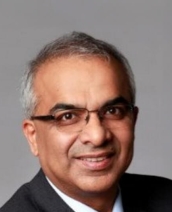Rajesh Duneja
Partner
Rajesh has extensive experience across strategy, policy development, financial assessment and implementation experiences across multiple geographies and industries.

Education
Past Experience

Rajesh is a Partner and a member of our global Telecommunications, Information, Media & Electronics (TIME) and Public Services Practices. Based in Dubai, he works in areas of telecom strategy, digital economic policy, regulation, and public policy.
Rajesh brings more than 25 years of experience working with ADL, a telecom equipment manufacturer, and a developmental bank. He has developed strategies for telecom operators in new growth areas, media regulators, and operators, national digital economic strategies, and advised boards on capital allocation. Additionally, he leads and supports the development of the real estate and tourism competence center in ADL.
Before joining Arthur D. Little, Rajesh worked for Motorola, ICICI (Infrastructure Project Finance), and leading strategy consulting firms. He holds a degree in business administration and a bachelor's in Electronics and Telecommunications Engineering

Community engagement in the Middle East

Charting the course

Smart regulation: The gateway to frontier innovation

ICT Start-ups in Saudi Arabia

Attracting foreign direct investment in cultivating digital economy

Transforming the ICT sector in Saudi Arabia through foreign direct investment

Rajesh is a Partner and a member of our global Telecommunications, Information, Media & Electronics (TIME) and Public Services Practices. Based in Dubai, he works in areas of telecom strategy, digital economic policy, regulation, and public policy.
Rajesh brings more than 25 years of experience working with ADL, a telecom equipment manufacturer, and a developmental bank. He has developed strategies for telecom operators in new growth areas, media regulators, and operators, national digital economic strategies, and advised boards on capital allocation. Additionally, he leads and supports the development of the real estate and tourism competence center in ADL.
Before joining Arthur D. Little, Rajesh worked for Motorola, ICICI (Infrastructure Project Finance), and leading strategy consulting firms. He holds a degree in business administration and a bachelor's in Electronics and Telecommunications Engineering

Community engagement in the Middle East

Charting the course

Smart regulation: The gateway to frontier innovation

ICT Start-ups in Saudi Arabia

Attracting foreign direct investment in cultivating digital economy

Transforming the ICT sector in Saudi Arabia through foreign direct investment
More About Rajesh
- Indian Institute of Management (IIM)MBA
- Indian Institute of Technology – BHU (IIT)B. Tech
- CFA
- MotorolaBusiness Manager
- BT TelconsultRegional Manager
- ICICIAssociate
- McKinsey & CoAssociate
